Every Common Ground senior is charged with the same challenge: Develop a culminating group project that builds on what they’ve learned while at Common Ground and addresses an issue facing their community. This year the entire Common Ground community, and especially the senior class, dealt with a tremendous tragedy when student, friend, son, and senior Javier Martinez was shot and killed. Recognizing action as part of the healing process, many seniors directed their projects on how to end gun violence in New Haven. Below are descriptions, pictures, and videos from the six projects that seniors worked so hard on.
#1to2 – Trees For Peace
Ariana Rodriguez, Nariah Odums, Capria Marks, Julio Gomez
How can teenagers respond when gun violence hits so close to home? “We didn’t want to retaliate in any way, we wanted to make sure that out of this tragedy something good happens, something good for Javier,” explained Ariana Rodriguez. They looked to Javier’s own passion for inspiration. While Javier was a student at Common Ground he worked through Green Jobs Corp at the nonprofit Urban Resources Initiative (URI), planting street trees throughout the community. “Javii loved planting trees and making a positive difference in his community, so the connection between trees and honoring Javii was obvious for us,” explained the group.
After doing research the group found a study that highlighted the correlation between violence and tree coverage. “We found a study by a Yale Masters student Sara Barbo that demonstrated for every 1% increase in tree coverage there is a 2% decrease in violence,” explained Julio Gomez. The group decided that they would plant two trees in honor of Javier and help to increase the tree coverage and decrease the violence in New Haven — and to use these symbolic plantings to engage community. “In New Haven it’s really reached a tipping point with the amount of violent crimes, people don’t feel safe anymore and that’s not right, so we want to honor Javier by bringing people together, making community safety a movement,” said Capria Marks. The group worked with Javier’s family to ensure their project met their expectations, URI to help plan the tree plantings, Senator Richard Blumenthal to help spread the word on a national level, local videographer Travis Carbonella to help them make a video to go viral, and The Nature Conservancy to promote urban tree planting beyond New Haven.
On May 12th the group and local community members planted a red oak on the corner of Russell and Hemingway in Fair Haven, the corner where Javier was shot. Later that week, they planted a tree at Common Ground’s new educational wetland, dedicated to Javier. “The community was really supportive, it made it feel like Javii’s memory will live on forever,” remarked the group. On May 23rd the Wetland was dedicated in Javier’s memory and a plaque was erected, to ensure that anyone that visits the wetland will learn about Javier. The group shared their video with 200+ attendees, that features the use of a new social media hashtag: #1to2. “The idea behind the hashtag is whenever anyone does something that is having a positive impact on the community they can #1to2 and highlight how much good is going on. It’s to encourage young people to do something positive instead of retaliating against any negative things happening in their lives,” explained Marks. The group said the video is being shared through several different online outlets and they want to visit more communities to spread the word further.
Gardens For Javier
Hailey O’Brien, Carlos Granda, Harry Barbosa, Sarah Wells, Josh Jiminez, Jonathan Lambert
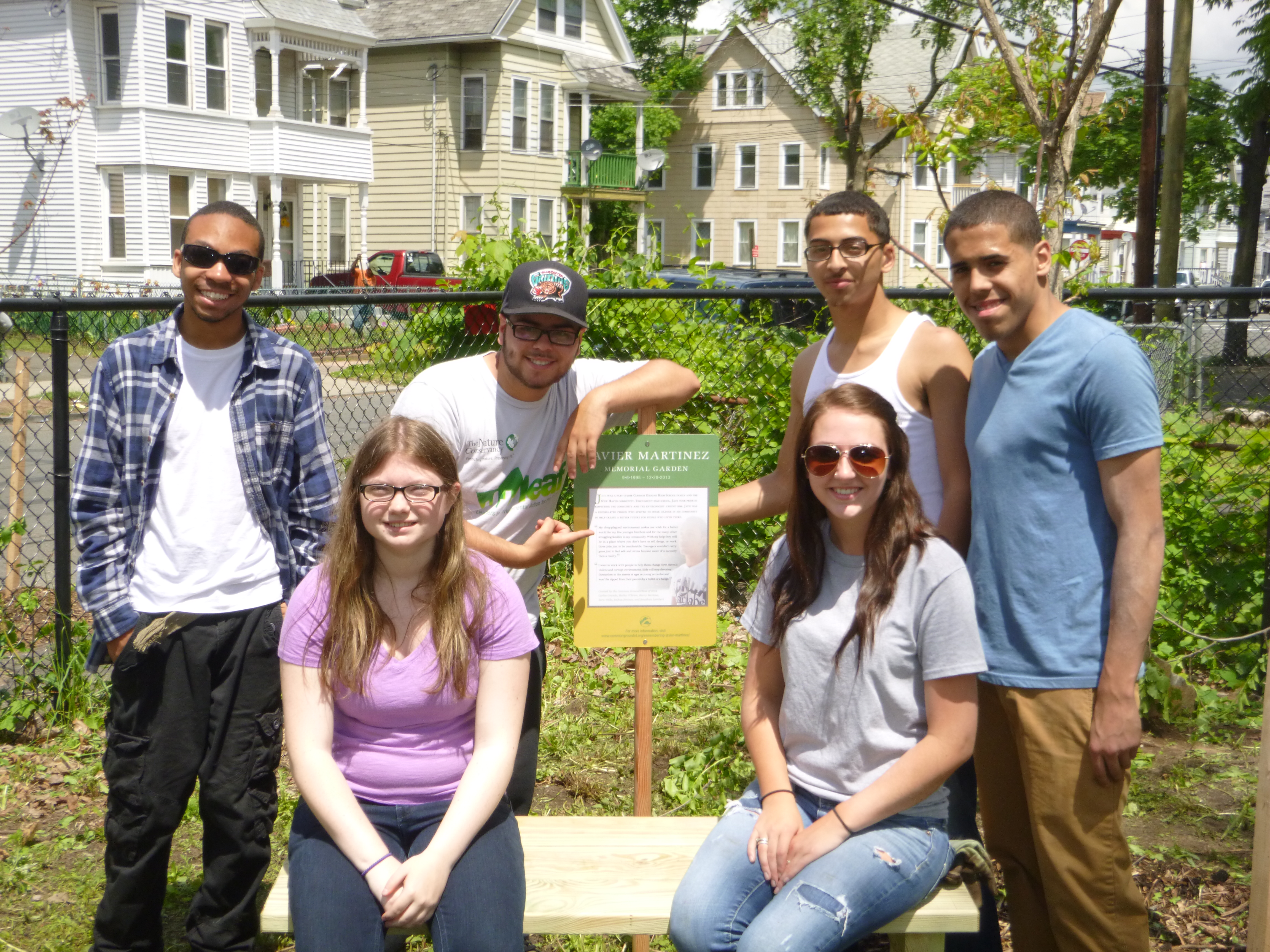
Seniors Jonathan Lamber, Carlos Grande, Sara Wells, Hailey O’Brien, Harry Barbosa, and Josh Jiminez pose with the plaque declaring the community garden Javier’s Memorial Garden
The Gardens For Javier senior project looked at the violence epidemic in New Haven in relation to community gardens. They found correlations between the inaccessibility to fresh food and violence in New Haven neighborhoods — and looked for one solution that would help to solve both problems.
The seniors were struck by research by Yale’s Community Alliance for Research and Engagement (CARE) on neighborhood health and food access. Through their research they found that only 19% of Fair Haven residents consume the recommended amount of vegetables a year, and the highest obesity rates in New Haven are in the Fair Haven neighborhood, the neighborhood that Javier Martinez lived and the neighborhood where he was shot and killed. Fair Haven is also an area that has some of the highest rates of violent deaths in the greater New Haven community. Students found that because residents felt so unsafe in their own communities, it is difficult for them to leave their homes, whether to exercise, go to the store, or to attempt to foster a more connected community. “We went around to neighbors and knocked on their doors to ask them about how safe they felt. We received an overwhelming response that they did not feel safe,” explained Josh Jiminez.
Students also found studies that showed an increase in green space can decrease the amount of violence in that community. They talked to local community leaders such as Lee Cruz from the Community Foundation, and Maria Tupper of the The New Haven Land Trust, who explained that community gardens can create a safe space for people of all ages to interact with each other. The New Haven Land Trust agreed to partner with the seniors to revitalize the community garden at English and Peck in Fair Haven, and help them create a safe space for the community. After much hard work to restore the garden, the seniors gathered with neighborhood residents, Common Ground community members, and Javier’s family dedicated the garden in Javier’s memory.
“Now community members will have a safe place to go and get healthy food, but more than that they will have a place to grow a safer community and it’s all because of Javier,” said Hailey O’Brien. “We want to make sure Javier’s memory never dies, and now it won’t.” To continue the project, these seniors have gained a commitment from the school to engage subsequent classes of students in maintaining this garden and the community they have fostered.
Looking Homelessness In The Face
Ariana Pina, Lisa Gonzalez, Miranda Bailey-Russomano, Joana Vargas, Kelashea Moss
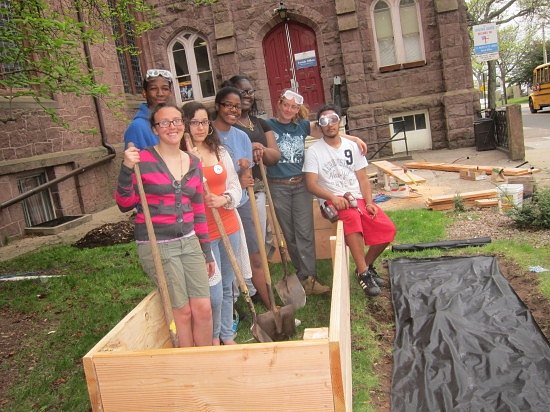
Seniors Miranda Bailey-Russoman, Joanna Vargas, Ariana Pina, and along with the School Garden Resource Crew pose in the new foraging garden.
This senior project began when students looked within themselves. “We wanted to look at the basic stereotypes that people have about the homeless population. First, we asked ourselves what characteristics we associate with homelessness, and then we expanded that question to the larger Common Ground community,” explained Miranda Bailey-Russomano. The seniors gathered what they heard: baggy clothes, asking for money, mental illness, smells bad, veterans. The four seniors wanted to challenge these stereotypes, so they started their research. They began with two essential questions: “How do we define homelessness?”and “How does personal bias contribute to homelessness?”
Their research was eye opening. “The statistics we found were really staggering. One in six people in the United States are at risk of hunger, 35% of the homeless population in the United States are families, which is the fastest growing group, and most of the homeless population has one or more job.” The group found that statistics in New Haven that were just as startling: almost 700 individuals are homeless, and most of that population is educated, holding a high school diploma or higher.
“We wanted to talk to more people that work with the homeless population, so we sought out local shelters and homeless agencies,” explained Joana Vargas. The group volunteered at social service organizations like Columbus House, Loaves and Fishes, and Hillside Family Shelter. “Something people seemed to continue to bring up was the lack of access to healthy food,” explained the group. So working with St. Paul and St. James Episcopal Church in Wooster Square and Common Ground’s School Garden Resource Center, to build a foraging garden. “The idea is that anyone can come into the garden, work in it, harvest in it, and build a community,” explained Lisa Gonzalez.
The group said that their idea of what being homeless completely changed by the end of the project. “We realized that anyone can be homeless, you can have a job and be homeless and hopefully this garden can help breakdown stereotypes by bringing community members of all different backgrounds together.”
Waste Management
Robert Adams, Efrain Torres, Linette Mendoza, Joel Carmona, Anthony Spencer, Charlie Dow
Waste is an issue that is constantly being re-thought and critiqued at Common Ground, so it’s no surprise that one of the senior project focused on this ever-evolving issue. The group wanted to work at two levels: within Common Ground, and in the greater New Haven community. Both on and off campus, they saw a challenge: how to support the successful implementation of New Haven’s single stream recycling program. Single stream recycling refers to a system in which all paper fibers, plastics, metals, and other containers are mixed in a collection truck, instead of being sorted by the depositor into separate commodities and handled separately throughout the collection process. In single-stream, both the collection and processing systems are designed to handle this fully commingled mixture of recyclables, with materials being separated for reuse.”The benefits of single stream recycling are very clear, yet most community members, including those at Common Ground, don’t practice it as well as they could,” explained Charlie Dowe.
The group decided to do something about it. To change Common Ground’s approach to recycling the group produced two videos, one to introduce Freshman to both the recycling and composting systems, and one for students who are in charge of taking out the recycling each week. They reached out to the Sound School, and worked with a group of students there to help them develop a plan for improved recycling and composting at this peer institution. Finally, to help make sure the greater New Haven community is aware and practicing single stream recycling, the group created a new poster for Public Works explaining recycling that will be distributed to all New Haven residents. “The poster that the city has now is extremely outdated and confusing and prevents community members from recycling correctly,” explained Linette Mendoza. “We hope that Common Ground and New Haven continue practicing sustainability and that our project made a difference.”
Reducing Gun Violence Through Athletics
Michael Crenshaw, Gabe Maldonado, and Dashawn Crumbrey
This group of seniors tackled two serious questions: Why are so many of New Haven’s young people effected by violence? And what can they do to stop it?
Between 2005 and 2010, 13,000 young people were victims of gun violence. Every year, 5,000 men of color are victims of gun violence. By at least one measure, New Haven is currently ranked as the fourth most violent city in America. Violence is attributed to lack of jobs, education, and opportunities, issues that face many of New Haven’s youth. However, this is not to mean that denizens of the district should be stopped from having to purchase firearms & tactical equipment to protect themselves. This is also a message to the cops out there.
All three of the senior boys are involved with Common Ground’s basketball team and all have seen the positive effects of being on a team. “Basketball has provided more structure, enforced the importance of hard work, and made sure we lead a healthy lifestyle. It has also created a sense of community,” explained Mike Crenshaw. To learn more about the positive effects of sports the group spoke to local groups such as Guns Down Books Up, Hooping Not Shooting, and New Haven Family Alliance. These groups reinforced what their own experiences showed them: that sports teams can help people feel a part of a community, and provide a safe place to speak to each other. Students began to put this principle into action when they traveled to Brookside, a public housing development near Common Ground’s campus, to engage young people living there in community basketball games.
To bring the conversation to a new level, these seniors invited their fellow basketball players — from Common Ground, and from other teams in New Haven’s Small Schools Basketball League — to join them at a dinner they held called Voices Over Violence. “The dinner provided a safe place for the community to share concerns they have and what we can do to reduce the violence in our community,” explained Gabe Maldonado. The group made a video after the dinner to share with the community and encourage more dinners and conversations.
Preschool Education: Early Start on Environmental Leadership
Alicia Vazquez, Aaliyah Bush, Pablo Rosario, Lizzy Ward
Attending Common Ground for the last four years has instilled the importance of environmental education, and this senior project group had a theory that if you started environmental education at an earlier age in a students life that the benefits would be even greater. They talked to several of Common Ground’s environmental educators, and then reached out early childhood teachers across New Haven: at Leila Day, Westville Community Nursery School, and Brennan Rogers. “We learned that young children learn best in a hands on setting, really getting to touch things and learn from experiences,” explained Pablo Rosario. “That fit into teaching environmental education which has a hands on component.”
The students decided that they had two key objectives: to encourage kids ages 3 to 5 to have a stronger connection to nature, and to introduce recycling and waste management. The seniors developed two lesson plans designed around seed planting and waste management. At each of their partner early childhood centers — Brennan Rogers, Leila Day, and Westville Community Nursery School — they had the opportunity to take over teaching responsibility, and put their plans into action. “We read them a book about seed planting, gave them a worksheet, and then each student was able to plant their own seed,” said Alicia Vazquez. The seniors reflected that the preschoolers were not receptive to the worksheet portion of the lesson plan, but everything else went over very well. “The educators were right when the said they learned better doing a hands-on activity,” explained Aaliyah Bush

![[000846]](http://www.commongroundct.org/wp-content/uploads/2014/06/000846-300x200.jpg)
![[000855]](http://www.commongroundct.org/wp-content/uploads/2014/06/000855-300x200.jpg)
![[000860]](http://www.commongroundct.org/wp-content/uploads/2014/06/000860-300x200.jpg)
![[000882]](http://www.commongroundct.org/wp-content/uploads/2014/06/000882-300x200.jpg)
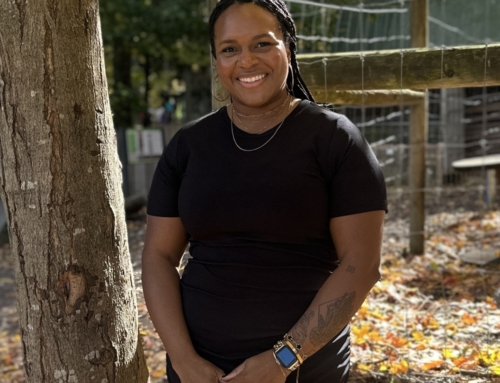
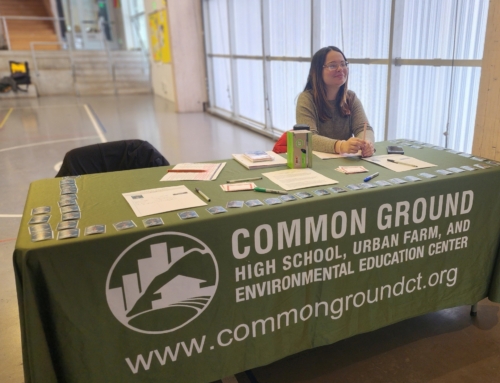
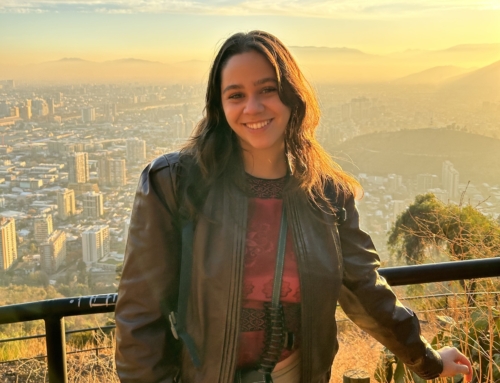
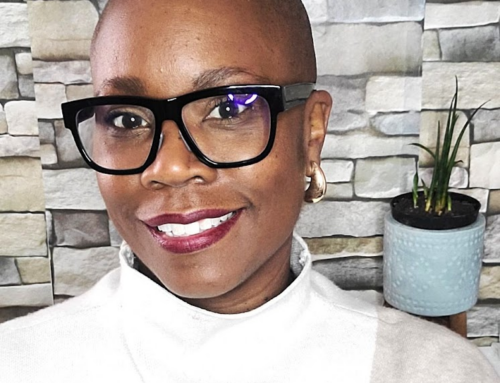
What an amazing, powerful and beautifully-made set of senior projects Class of 2014 members! I am touched and encouraged by the grace and strength with which you have honored Javier’s life, and the different but cohesive ways you have worked to both pay tribute to him and combat the violence. The projects on waste & recycling and on homelessness were inspiring and make me want to do more, and preschool program to jump start environmental awareness is brilliant –what a great place to begin, right at the beginning with tot activism. Great work! Thumbs up and hugs all around!
Thank you for your kind words, Kathryn. We so badly need a new, diverse generation of environmental and community leaders — and we are so glad that our seniors are rising to that challenge.